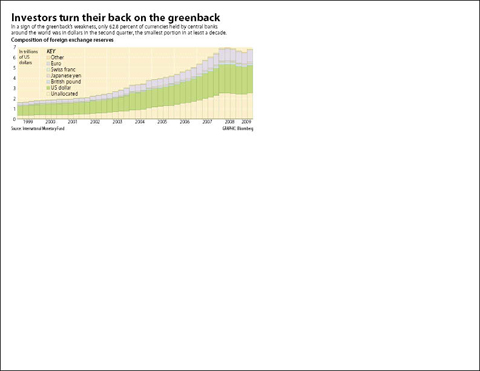The US dollar fell for the first time in three weeks against the euro as calls for a “strong” US currency failed to reassure investors concerned the government and Federal Reserve will accept declines in the greenback.
Traders shifted funds to the Australian dollar, making it the best performer this week among 16 major currencies.
The US dollar fell 1.1 percent to US$1.4732 per euro on Friday in New York, from US$1.4576 last Friday, in the first weekly decline since its 1 percent slide in the five days ended Sept. 18. The US currency was little changed at ¥89.78, compared with ¥89.81, before the Bank of Japan’s meeting next week. The euro climbed 1 percent to ¥132.25.

The Australian dollar rose 4.4 percent to US$0.9036 in the biggest weekly gain since May after the Reserve Bank unexpectedly raised the overnight cash target by a quarter-percentage point to 3.25 percent on Tuesday.
Sterling was the only loser versus the dollar this week among the 16 most-traded currencies. It fell 0.7 percent to US$1.5842 in a fourth weekly drop on speculation the economy remains too weak for the Bank of England to consider raising borrowing costs and stop asset purchases.
India’s rupee led weekly gains in Asian currencies as signs the region is recovering from a global recession attracted investment, overwhelming attempts by central banks to stem appreciation.
The New Taiwan dollar fell for a second day on Friday to NT$32.24 against its US counterpart, according to Taipei Forex Inc. The NT dollar reached NT$31.995 last Thursday, the strongest level since the same date last year.
The NT dollar has gained 1.6 percent in the past month against the greenback as overseas funds bought US$3.4 billion more Taiwanese shares than they sold.
The rupee jumped 2.7 percent this week to 46.475, according to data compiled by Bloomberg. Malaysia’s ringgit rose 2.4 percent to 3.3981, Indonesia’s rupiah climbed 2 percent to 9,455 and South Korea’s won rose 0.9 percent to 1,164.38.
The Philippine peso climbed 1.4 percent this week to 46.46. The Singapore dollar climbed 1.7 percent to close at a 14-month high of S$1.3928.

Authorities have detained three former Taiwan Semiconductor Manufacturing Co (TMSC, 台積電) employees on suspicion of compromising classified technology used in making 2-nanometer chips, the Taiwan High Prosecutors’ Office said yesterday. Prosecutors are holding a former TSMC engineer surnamed Chen (陳) and two recently sacked TSMC engineers, including one person surnamed Wu (吳) in detention with restricted communication, following an investigation launched on July 25, a statement said. The announcement came a day after Nikkei Asia reported on the technology theft in an exclusive story, saying TSMC had fired two workers for contravening data rules on advanced chipmaking technology. Two-nanometer wafers are the most

Tsunami waves were possible in three areas of Kamchatka in Russia’s Far East, the Russian Ministry for Emergency Services said yesterday after a magnitude 7.0 earthquake hit the nearby Kuril Islands. “The expected wave heights are low, but you must still move away from the shore,” the ministry said on the Telegram messaging app, after the latest seismic activity in the area. However, the Pacific Tsunami Warning System in Hawaii said there was no tsunami warning after the quake. The Russian tsunami alert was later canceled. Overnight, the Krasheninnikov volcano in Kamchatka erupted for the first time in 600 years, Russia’s RIA

South Korea yesterday said that it was removing loudspeakers used to blare K-pop and news reports to North Korea, as the new administration in Seoul tries to ease tensions with its bellicose neighbor. The nations, still technically at war, had already halted propaganda broadcasts along the demilitarized zone, Seoul’s military said in June after the election of South Korean President Lee Jae-myung. It said in June that Pyongyang stopped transmitting bizarre, unsettling noises along the border that had become a major nuisance for South Korean residents, a day after South Korea’s loudspeakers fell silent. “Starting today, the military has begun removing the loudspeakers,”

CHINA’s BULLYING: The former British prime minister said that he believes ‘Taiwan can and will’ protect its freedom and democracy, as its people are lovers of liberty Former British prime minister Boris Johnson yesterday said Western nations should have the courage to stand with and deepen their economic partnerships with Taiwan in the face of China’s intensified pressure. He made the remarks at the ninth Ketagalan Forum: 2025 Indo-Pacific Security Dialogue hosted by the Ministry of Foreign Affairs and the Prospect Foundation in Taipei. Johnson, who is visiting Taiwan for the first time, said he had seen Taiwan’s coastline on a screen on his indoor bicycle, but wanted to learn more about the nation, including its artificial intelligence (AI) development, the key technology of the 21st century. Calling himself an